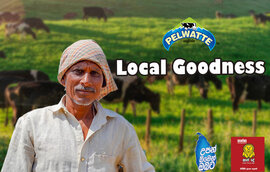Pelwatte expands production and growth, continues to support farmers and the industry amidst the unprecedented times
Summary
Pelwatte Dairy Industries, the local dairy giant, has recorded a quarterly Dairy Milk Collection Growth of 24% compared to 2021. The dairy giant has also recorded an overall growth of 41% in its milk collection network island-wide compared to the […]
Pelwatte Dairy Industries, the local dairy giant, has recorded a quarterly Dairy Milk Collection Growth of 24% compared to 2021. The dairy giant has also recorded an overall growth of 41% in its milk collection network island-wide compared to the Q1 of the year 2020.

“The growth not only signifies the growth of the company but that of also the dairy communities, associated industries and micro-economies. We are humbled by the progress we have made thus far. The pandemic caused a lot of uncertainties. I convey my gratitude to all our customers, staff and authorities for the continuous support, said the Managing Director of Pelwatte Dairy.
Pelwatte Dairy set up several facilities, streamlined management and strengthened its core competencies over the last year. The company set up new chilling centres, made effective use of the SAPP facility it received and also introduced two new flavours amidst the pandemic.
These measures and approaches have ensured an effective and efficient usage of resources, thereby improving productivity, uplifting lives and reviving the industry and the economy.
During the first quarter of the year, Pelwatte Dairy was able to introduce two new flavours as Faluda and Ginger Biscuit to its diverse and growing range of flavors; and it is notable to mention that it has turned to become one of the most loved ones in just a few months.
The company invested over Rs 35 Million to set up New Chilling Centres and 1500 Units of Milk cans. These served as spots for milking, storage and as points of collection and transportation of the milk. It has involved farmers in evening milking which has increased the quality of milk too.
The chilling centres and milking sheds were equipped with all necessary equipment as milking machines and all required infrastructure to provide a comfortable environment for the cattle and the farmers. This has helped in delivering the milk to the processing plant on time; increasing the productivity and efficiency of the production and distribution.
The company recorded a strong 89% growth in the Uva province, a 13% growth in the Hill Country, a 39% growth in the North Central, a 56% growth in the North-Western and a stern 20 % growth in the Eastern Province. While this remains a testament to the growth of production and operations.
Pelwatte Dairy secured Rs. 463 million from the Smallholder Agribusiness Partnerships Program (SAPP) a few months ago and since then has been involved in catalyzing it on 1000 farmers during its first phase. The farmers have been able to enhance their infrastructure facilities and avail themselves of professional training and development opportunities. The project facility revolves around a 4P value chain model that brings public sector, rural smallholder farmers and private sector companies to a common platform, uplifting the economic and social standards of the rural farmer communities while improving the overall productivity of milk production.
With over a registered dairy farmer base of over 12,500, and over 40 milk collecting centres encompassing the above mentioned provinces, Pelwatte hoards over 200,000 litres a day collectively. As a beneficiary of the project facility, Pelwatte Dairy believes it will be able to double the existing daily milk production by the third year. The project has created new jobs and opportunities while also developing women empowerment and improving youth participation in the industry. The initiative will promote youth entrepreneurship with several with the overlook of several mentors. SAPP will educate beneficiaries on the impacts of climate change and resilience. The project facility will also be able to create fodder and silage providers. The facility has allowed the company to improve the quality of the milk and improve herd management.
Beneficiary farmers have also been able to avail themselves of credit facilities with subsidised interest rates under easy payment schemes.